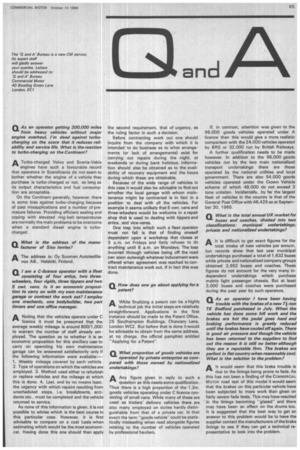Q I am a C-licence operator with a fleet consisting of
Page 87

If you've noticed an error in this article please click here to report it so we can fix it.
four attics, two threewheelers, four rigids, three tippers and two 5 cwt. vans. Is it an economic proposition to carry on with my own maintenance garage or contract the work out I employ one mechanic, one bodybuilder, two part timers and one office manager.
A Noting that the vehicles operate under C licence it must be presumed that the average weekly mileage is around 800/1,000
to warrant the number of staff already employed. The question as to whether it is an economic proposition for this ancillary user to carry on operating his own maintenance garage can be answered satisfactorily only if the following information were available: 1. Weekly mileage covered by each vehicle.
2. Type of operations on which the vehicles are employed. 3. Method used either to refurbish or replace vehicles and the mileage at which this is done. 4. Last, and by no means least, the urgency with which repairs resulting from unscheduled stops, i.e. breakdowns, accidents etc., must be completed and the vehicle returned to service.
As none of this information is given, it is not possible to advise which is the best course in this particular case. However, it is first advisable to compare on a cost basis when estimating which would be the most economical. Having done this one should then apply the second requirement, that of urgency, as the ruling factor in such a decision.
Before contracting work out one should inquire from the company with which it is intended to do business as to what arrangements for lack of arrangements) exist for carrying out repairs during the night, at weekends or during bank holidays. Information should also be obtained as to the availability of recovery equipment and the hours during which these are obtainable.
Because of the wide range of vehicles in this case it would also be advisable to find out whether the local garage with whom maintenance might be contracted is in fact in a position to deal with all the vehicles. For example it seems unlikely that 5-cwt vans and three-wheelers would be welcome in a repair shop that is used to dealing with tippers and artics, and vice-versa.
One trap into which such a fleet operator must not fall is that of finding oneself dependent upon a workshop that closes at 5 p.m. on Fridays and flatly refuses to do anything until 8 a.m. on Mondays. The loss incurred through vehicles being off the road can soon outweigh whatever inducement were offered when agreement was reached to contract maintenance work out, if in fact this was done.
QHow does one go about applying fore patent?
A White finalizing a patent can be a highly
technical job the initial steps are relatively straightforward. Applications in the first instance should be made to the Patent Office, 25 Southampton Buildings, Chancery Lane, London WC2. But before that is done it would be advisable to obtain from the same address, at no charge, the official pamphlet entitled "Applying for a Patent".
































































































































